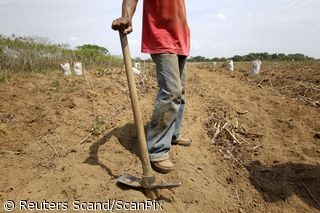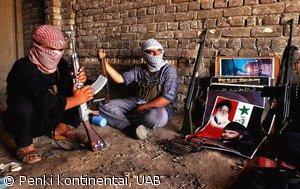Poland and Russia on Saturday mourned thousands of people massacred by the Soviet NKVD secret police during World War Two.
Published:
4 September 2000 y., Monday
Poland and Russia on Saturday mourned thousands of people massacred by the Soviet NKVD secret police during World War Two and vowed to strengthen the often strained relations between the two neighbors.
Polish Premier Jerzy Buzek and Russian Interior Minister Vladimir Rushailo dedicated a cemetery marking the mass grave of some 6,000 Poles shot in pine forests outside the Russian town of Mednoye, 200 km (125 miles) northwest of Moscow.
It is one of several mass graves in Russia and Ukraine that hold the bodies of some 22,000 well-educated Poles, including reserve officers, border guards, policemen and civil servants who the Soviets feared would oppose their control of Poland.
Soviet troops invaded Poland in September 1939 under a secret pact with Nazi Germany to divide Eastern Europe. The Germans broke the pact in 1941 when they invaded the Soviet Union and the territories it had occupied.
In 1943, German troops advancing eastward found the bodies of some 4,000 Polish army officers in a mass grave in Katyn and accused Soviet troops of killing them.
The Soviet Union maintained for decades that the Nazis had killed the men during their occupation of the area, admitting responsibility only in the final days of Mikhail Gorbachev's perestroika period. During World War Two, Poland's underground government also searched for officers who disappeared from prisoner of war camps near other towns, including Tver in Russia, from where prisoners were taken to the forest outside Mednoye. The bodies of about 7,000 Poles have never been found.
Šaltinis:
Central Europe Online
Copying, publishing, announcing any information from the News.lt portal without written permission of News.lt editorial office is prohibited.
The most popular articles
 EU animal welfare rules must be more rigorously enforced, with more inspections and effective penalties, said the Agriculture Committee on Wednesday.
more »
EU animal welfare rules must be more rigorously enforced, with more inspections and effective penalties, said the Agriculture Committee on Wednesday.
more »
 Fifty-three year old Rasima collects dirt everyday from a paddy field in Indonesia’s east Java province, turning it into a snack made entirely from soil, called "ampo."
more »
Fifty-three year old Rasima collects dirt everyday from a paddy field in Indonesia’s east Java province, turning it into a snack made entirely from soil, called "ampo."
more »
 At the moment an Argentinian working for a French company in Spain can't travel to France for a meeting on his long-term visa.
more »
At the moment an Argentinian working for a French company in Spain can't travel to France for a meeting on his long-term visa.
more »
 An EU-wide strategy is needed to combat violence against women, which must be recognised as a crime, said participants in a European Parliament public hearing with national parliaments and civil society representatives, held on Tuesday to mark International Women's Day.
more »
An EU-wide strategy is needed to combat violence against women, which must be recognised as a crime, said participants in a European Parliament public hearing with national parliaments and civil society representatives, held on Tuesday to mark International Women's Day.
more »
 You know its Tet in Vietnam when Peach and Kumquat orange trees decorate every home, shop and public establishment.
more »
You know its Tet in Vietnam when Peach and Kumquat orange trees decorate every home, shop and public establishment.
more »
 A surveyor has set up his tripod and instruments under a hot tropical sun to measure plots of land in a village where the Dac Kray minority community were settled four years ago.
more »
A surveyor has set up his tripod and instruments under a hot tropical sun to measure plots of land in a village where the Dac Kray minority community were settled four years ago.
more »
 Japanese men are answering the call of Valentine s Day a month late.
more »
Japanese men are answering the call of Valentine s Day a month late.
more »
 In three urgent resolutions adopted on Thursday, Parliament urges Hamas to release kidnapped Israeli soldier Gilad Shalit, deplores the escalating criminal violence in Mexico and calls on South Korea to scrap the death penalty.
more »
In three urgent resolutions adopted on Thursday, Parliament urges Hamas to release kidnapped Israeli soldier Gilad Shalit, deplores the escalating criminal violence in Mexico and calls on South Korea to scrap the death penalty.
more »
 The plight of Europe's 10 million Roma population will fall under the spotlight Tuesday afternoon when MEPs discuss an upcoming Roman summit.
more »
The plight of Europe's 10 million Roma population will fall under the spotlight Tuesday afternoon when MEPs discuss an upcoming Roman summit.
more »
 EU Employment and Social Affairs Ministers have today adopted a Directive to prevent injuries and infections to healthcare workers from sharp objects such as needle sticks – one of the most serious health and safety threats in European workplaces and estimated to cause 1 million injuries each year.
more »
EU Employment and Social Affairs Ministers have today adopted a Directive to prevent injuries and infections to healthcare workers from sharp objects such as needle sticks – one of the most serious health and safety threats in European workplaces and estimated to cause 1 million injuries each year.
more »